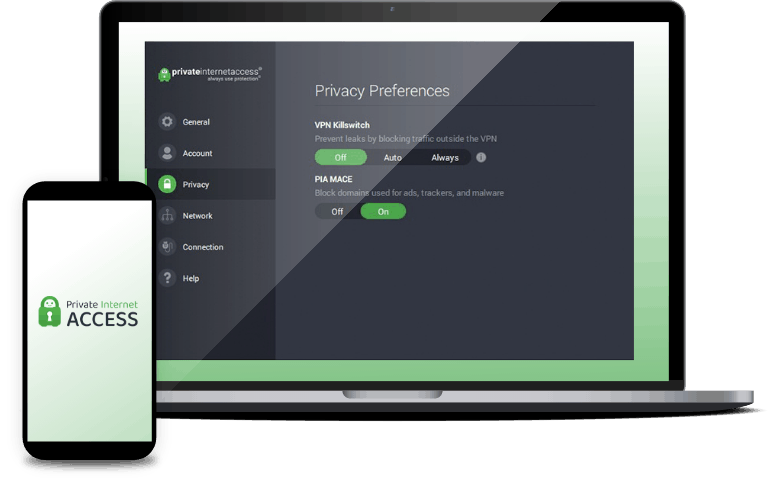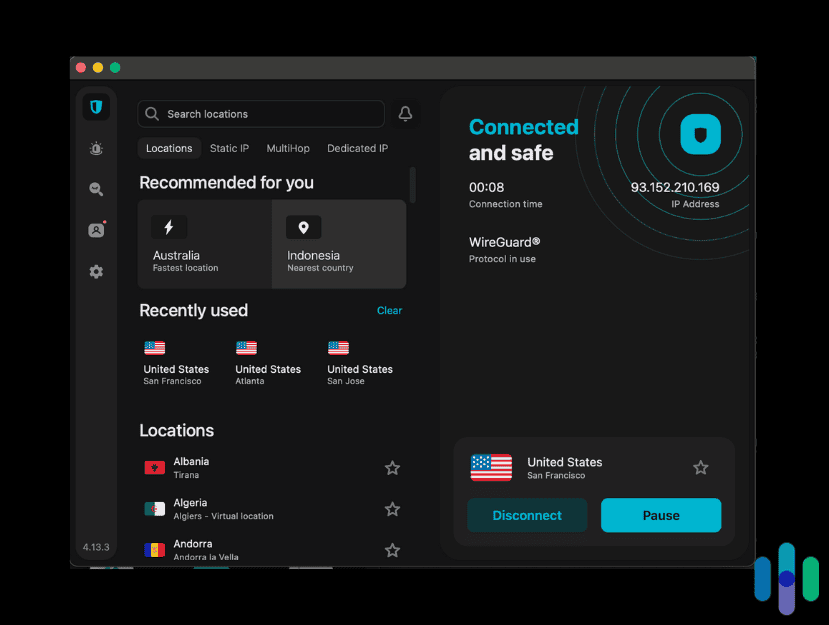Private Internet Access Review 2025 — Expert Tested
Private Internet Access earned the third spot in our 2025 VPN rankings with its strong focus on usability and convenience, but our tests show it still has some holes to fill.
 Aliza Vigderman, Senior Editor, Industry Analyst
&
Aliza Vigderman, Senior Editor, Industry Analyst
&
 Gabe Turner, Chief Editor
Last Updated on Apr 08, 2025
Gabe Turner, Chief Editor
Last Updated on Apr 08, 2025
What We Like
- Excellent user experience: PIA has apps for all platforms, and they’re very easy to use. Plus, the VPN’s apps come with great perks, including automation options, a customizable connection screen, and a great split-tunneling tool.
- Very good P2P support: The VPN allows torrenting on all of its servers. It also provides access to additional tools that can boost torrenting speeds.
- Unlimited simultaneous connections: You can install and use PIA on as many devices as you want, so it’s a perfect pick for large families.
What We Don't Like
- Slower upload speed: In every speed test we performed, the upload speed was always significantly slower than the download speed.
- Not very feature-rich: While PIA provides access to some good privacy and security features, it’s not as feature-rich as some other top competitors.
- Live chat issues: We sometimes had trouble accessing and using the live chat system. And we also came across a few live chat reps that weren’t helpful.
Bottom Line
Private Internet Access can work on so many levels, whether you want to prioritize privacy, speed, or both. It’s one of the most user-friendly VPNs, and even though it doesn’t have the fastest upload speeds, it’s a well-balanced option for casual and pro users.Private Internet Access (PIA VPN) stands out for more than just its no-nonsense name. We love how its customizations can optimize your connection and minimize the speed decrease that comes from routing your traffic through a remote server. We also like the easy-to-use apps, and its generally low price point. Those are some of the reasons it made our list of the best VPNs of 2025.
To be clear, Private Internet Access falls short when it comes to a few things. We particularly don’t like the slow upload speeds and lack of features compared to the competition. It’s far from perfect, which is why we test and review VPNs like PIA. Let’s go over the results of our latest tests so you can see if PIA has what it takes for you.
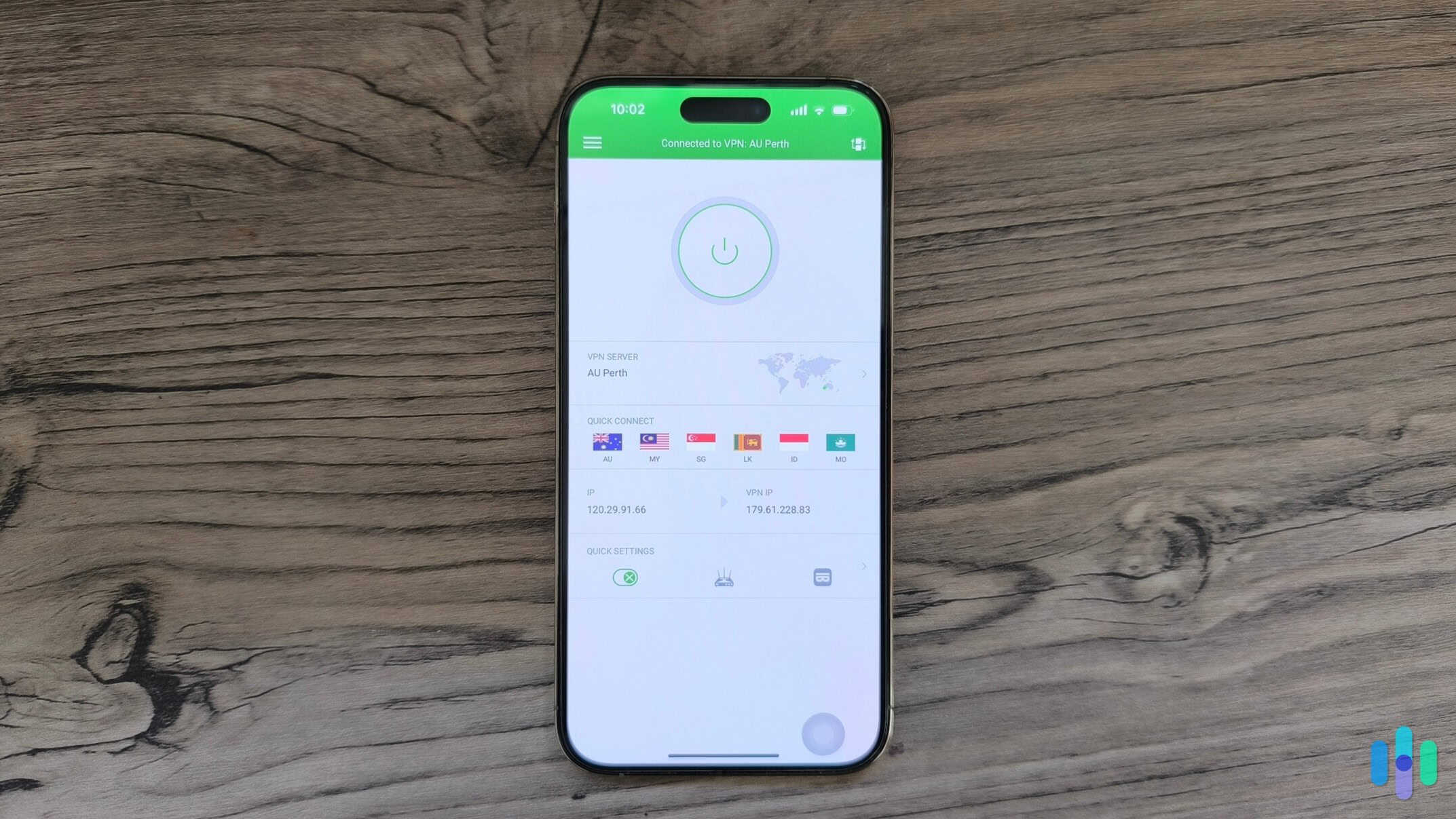
Overall Rating
- Provides excellent torrenting support
- Has very intuitive apps that are highly customizable
- Supports unlimited simultaneous connections
How We Tested Private Internet Access
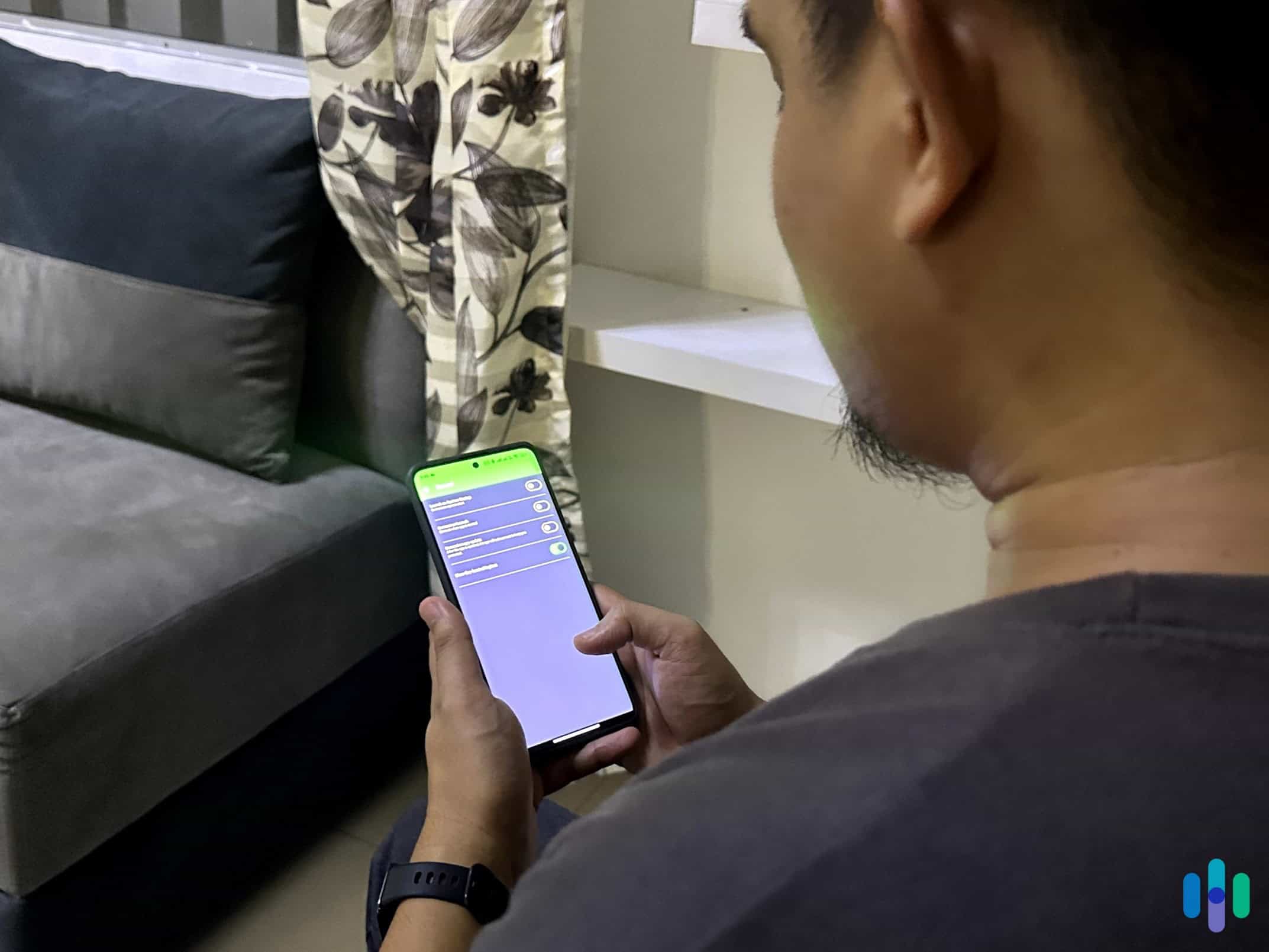
The main devices we used for the tests were the following:
- Acer laptop running Windows 11
- MacBook Air running macOS 14
- Android 14 smartphone
- iPhone 14 Pro Max running iOS 18
After we had connected all of our devices, we spent two months both conducting purposeful tests of the VPN and going about our usual business online. We wanted to put Private Internet Access through its paces, but we also wanted to see how the average home user might experience this VPN while browsing social media, streaming videos, and so on. The following review is what we discovered during both our explicit tasks and our day-to-day activities.
>> Read More: About Our Company & Editorial Standards
Private Internet Access Pricing
As with other VPN services, the average cost per month of Private Internet Access decreases the longer you commit to using the service, with the lowest cost per month being for a three-year contract. At the time of writing, the three-year contract included four free additional months for an up-front cost of $79. All that averages out to $1.98 per month. The month-to-month cost of PIA is $11.95. These prices are largely in line with the average cost of a VPN. The prices for PIA are also far below that of an expensive offering like Astrill VPN, which can cost up to $30 per month.
Below is a simple breakdown of the current PIA contracts and their prices.
| Private Internet Access subscriptions | 1 Month | 1 Year | 3 Years + 4 Months Free |
|---|---|---|---|
| Total Amount Billed | $11.95 | $39.95 | $79.00 |
| Average Cost Per Month | $11.95 | $3.33 | $1.98 |
With a best per-month price of $1.98, Private Internet Access is one of the most affordable VPNs we’ve tested. It’s comparable to (but often slightly cheaper than) NordVPN’s pricing and Surfshark’s pricing. However, these VPN services are always running discounts and deals, so it’s important to check the latest offers if you’re looking to get the best deal possible.
It’s also worth pointing out that Private Internet Access, much like Surfshark, doesn’t limit the number of devices you can use. A lot of the competition, including NordVPN, impose limits on how many devices you can connect at a time. Not PIA, though.
>> Compare: Private Internet Access vs. NordVPN
FYI: Take advantage of PIA VPN’s 30-day money-back guarantee. Buy a subscription, test it out, and if you don’t like it, cancel your subscription within 30 days and request a refund. Requesting a refund from PIA is, in our experience, pretty straightforward. Just make sure you keep your digital receipt.
Private Internet Access Features
We decided to split PIA’s features into three separate categories:
- Privacy features. In this section, we’ll cover features that protect your online privacy. For example, we’ll discuss whether or not the VPN logs your device’s IP address or if the VPN protects you against traffic leaks with a kill switch. We’ll also share whether the VPN has any built-in features that enhance your online privacy, like a double VPN connection.
- Security features. This part will cover how the VPN secures your internet traffic via encryption ciphers and VPN protocols. We’ll also discuss features that enhance the VPN’s encryption or help protect you against online threats.
- Servers, streaming, and torrenting. We’ll discuss how large the VPN’s server network is, if its servers are RAM-based, if the VPN works with popular streaming services, and if the VPN service allows torrenting and offers access to features that boost P2P speeds.
Private Internet Access Privacy Features
Highlights:
- Independently audited no-logs policy
- Open-source apps
- Customizable kill switch
- SOCKS5 multihop
- Email breach monitoring
We consider Private Internet Access to be one of the best no-logs VPNs in 2025. We assessed its entire privacy policy, and it clearly says that the VPN doesn’t log your IP address or browsing traffic. What’s more, PIA also doesn’t log connection time stamps, so it doesn’t know when you connect to a VPN server. It also doesn’t record bandwidth usage, so the VPN doesn’t know how much data you transmit over the VPN connection.
We also think it’s really easy to trust Private Internet Access since its no-logs policy has been independently audited, and it has also been proven true in several court documents. PIA even releases a quarterly transparency report that shows law enforcement requests for user data and how many of them the company complied with (it’s usually zero).
Tech Tip: All of PIA’s apps are open-source, which means anyone can review the app code. If you’re very tech-savvy, you can check the code yourself to make sure the apps are completely safe to use.
The biggest argument against PIA when it comes to privacy is the fact that it’s based in the United States. As part of the Five Eyes alliance, the US has agreed to share surveillance data with other countries. It’s also possible for a US court to compel PIA to share user data. Given the fact that PIA doesn’t save data on user activities, the US base shouldn’t be a dealbreaker for most people.
PIA also provides access to the following privacy features:
Kill Switch
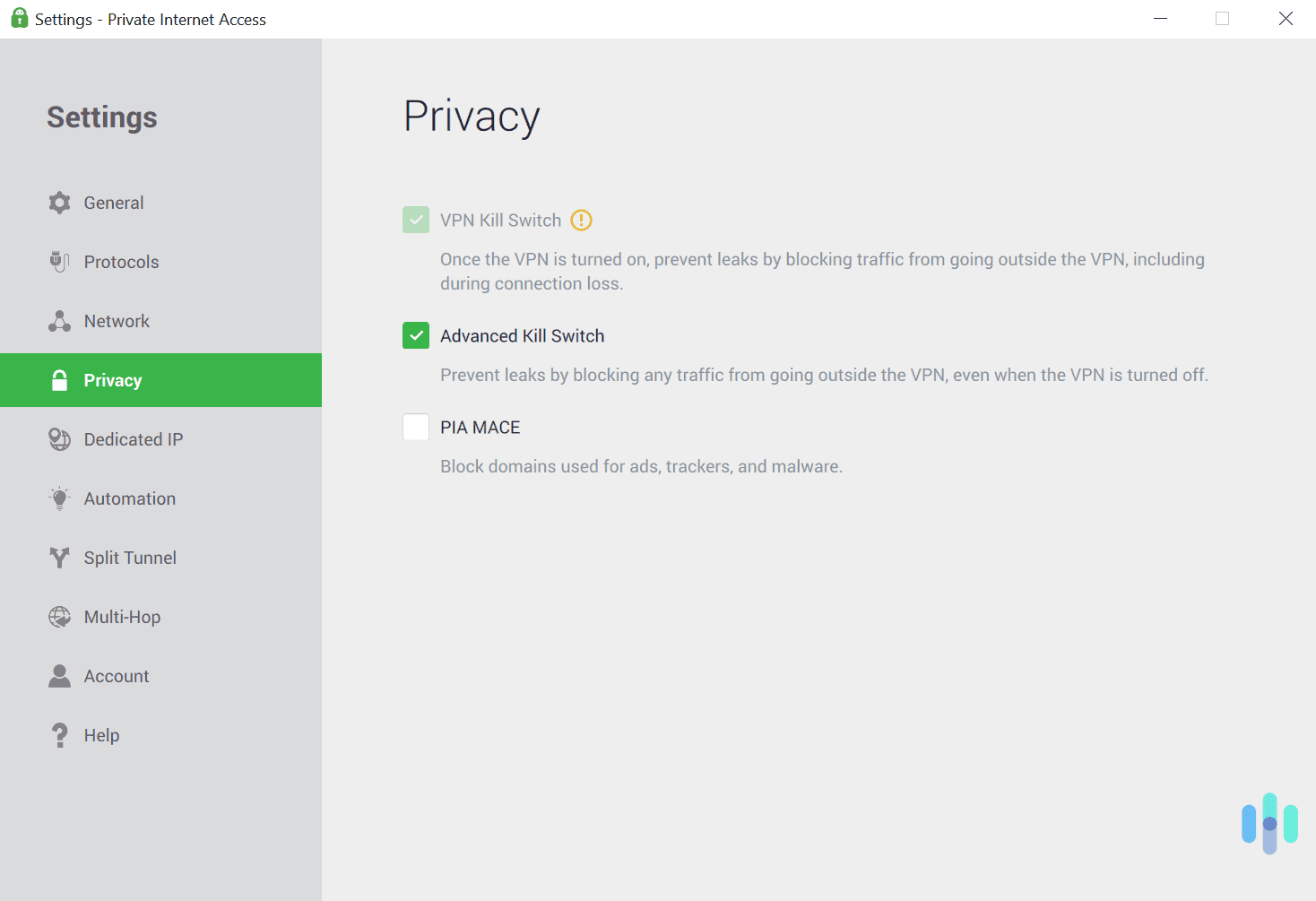
A kill switch ensures that your internet connection goes down if your VPN connection drops. Without this feature, your IP address and activity becomes exposed when the VPN disconnects. If you’re doing something your ISP doesn’t like when this happens, it’s bad news.
We also like how Private Internet Access provides access to a more aggressive kill switch option, called “Advanced Kill Switch.” If you enable it, you won’t be able to connect to the internet at all until you first connect to one of PIA’s servers. This kind of option comes in handy when you want to make sure you don’t accidentally use the internet without first securing your internet traffic with the VPN. This would apply to you if you want to download torrents or use the VPN on company devices.
>> Related: The Best VPNs for Businesses in 2025
FYI: We tested PIA’s aggressive kill switch option, and it works very well. It prevented us from going online every time we tried to use the internet without connecting to the VPN first.
SOCKS5 Multihop
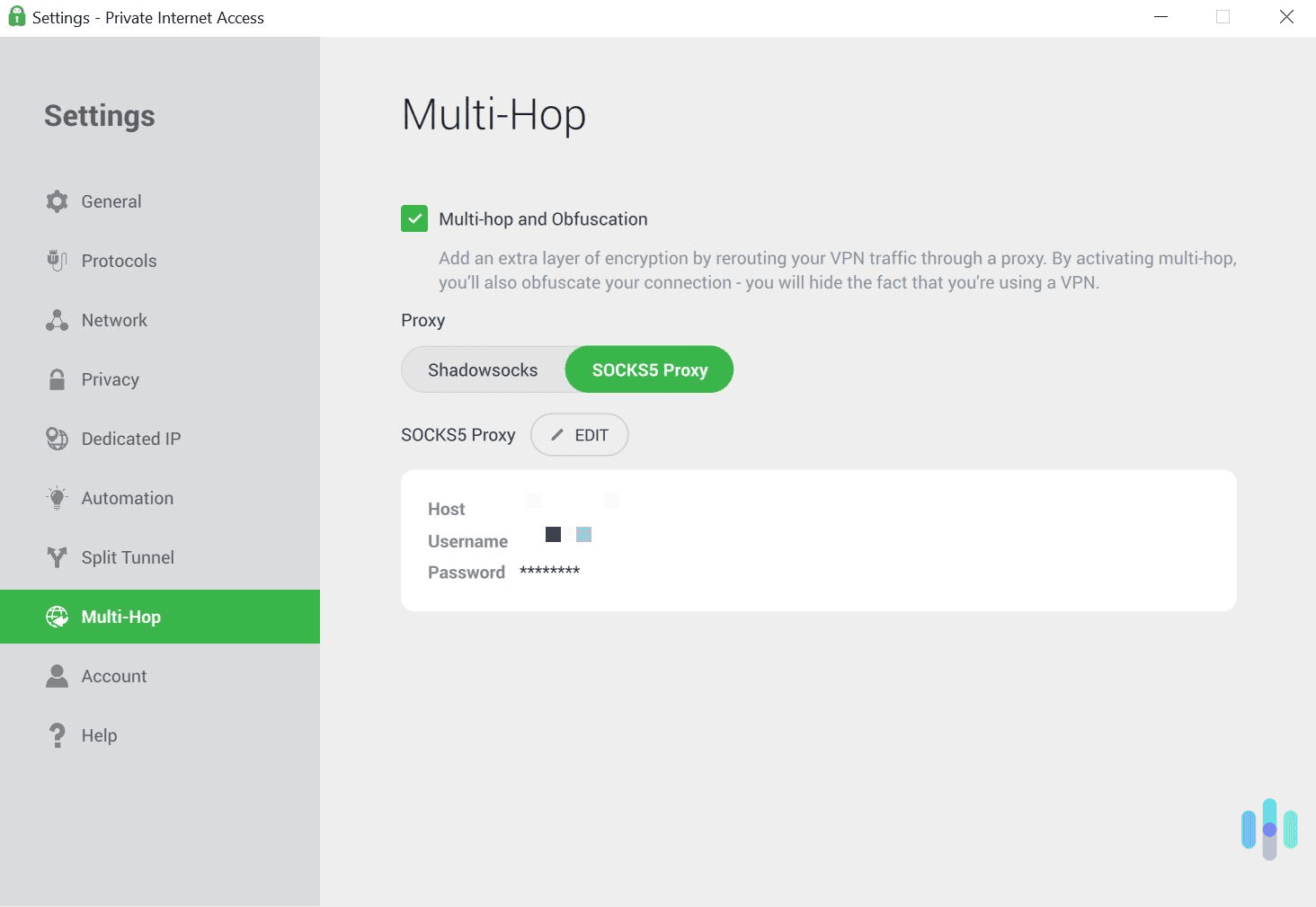
Private Internet Access allows you to set up a multihop connection through a SOCKS5 proxy server in its apps. This means your connection will first go through PIA’s SOCKS5 proxy before it goes through the VPN. A SOCKS5 proxy server hides your IP address just like a VPN server, but it doesn’t provide encryption (see our proxy vs. VPN guide). Unlike NordVPN’s multihop (called Double VPN) that uses two VPN servers, PIA’s proxy-to-VPN multihop has a lower impact on your internet speed.
Using SOCKS5 multihop means your real IP address will be hidden behind two different server IPs — the SOCKS5 IP address and the VPN IP address. We recommend using this setup if you’re very privacy-focused.
Setting up the SOCKS5 multihop connection isn’t very difficult, but it can be a bit confusing if you’ve never done this. Luckily, Private Internet Access provides access to a short guide that shows you exactly what you need to do.1
Just remember that this connection setup doesn’t provide the same level of privacy and security as a double VPN connection. That’s where your traffic is sent through two VPN servers, so you get an extra layer of encryption. If you’d prefer to use a double VPN connection instead, we recommend using Surfshark since its Dynamic MultiHop feature is perfect for this.
>> Related: Private Internet Access vs. Surfshark
Identity Guard
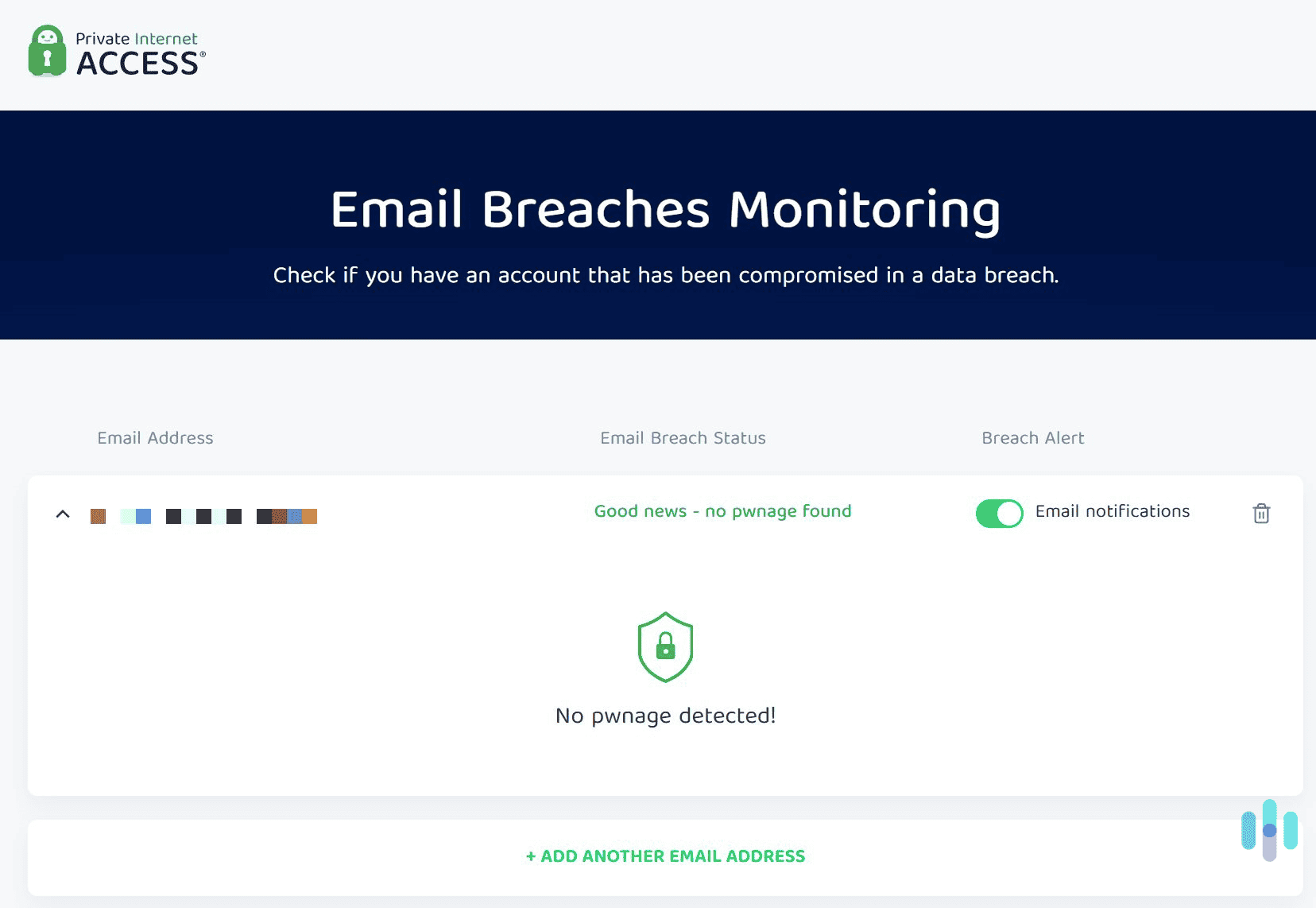
Identity Guard is a privacy feature that’s available via the account dashboard on Private Internet Access’ website. It’s great for protecting your privacy since it provides data breach monitoring for up to two email addresses. Basically, it will alert you if your email address is compromised in a data breach.
We’re happy to see this feature, as it provides a decent level of protection against identity theft. That said, if you’re interested in a more comprehensive solution, we recommend checking out our list of the best identity theft protection services in 2025.
Pro Tip: PIA isn’t the only VPN that offers to monitor email addresses; it’s a feature included in “Surfshark Alert,” which comes standard with any Surfshark One subscription (VPN + antivirus bundle). Surfshark Alert is actually better because it monitors more than just emails. See what it can do in our Surfshark Alert review.
Private Internet Access Security Features
Highlights:
- Encryption and VPN protocols
- Obfuscation
- MACE ad-blocker
In this section, we’ll discuss what encryption and VPN protocols Private Internet Access uses to secure your data. We’ll also cover two security features that enhance the VPN’s encryption and protect you from digital threats, namely obfuscation and MACE.
Encryption & VPN Protocols
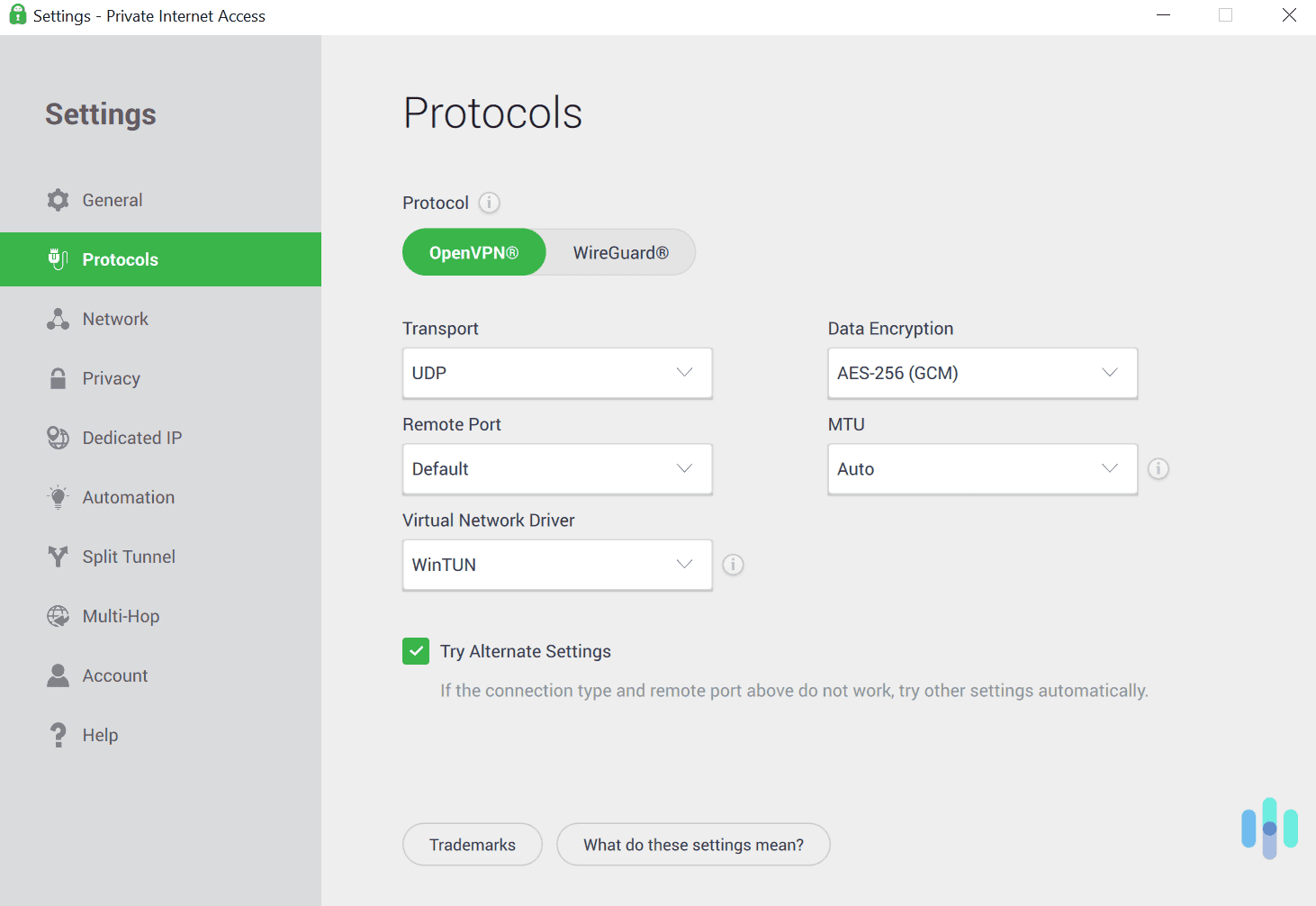
Our research shows that PIA provides access to industry-standard encryption ciphers and VPN protocols. This includes:
- OpenVPN. This is a really secure protocol that can be configured to use military-grade, 256-bit AES encryption ciphers. It provides decent speeds, though it’s definitely not the fastest out there. We like how PIA lets you switch to 128-bit AES encryption, as it’s slightly faster than 256-bit AES encryption (but still very secure). That said, we still mainly recommend only using OpenVPN if you’re very focused on security and need to bypass VPN blocks on your network (i.e. office or school networks).
- WireGuard. This protocol uses the ChaCha20 encryption cipher, which is about as secure as AES. It’s also designed to be very lightweight and fast. WireGuard is newer than OpenVPN, but pretty much all top VPNs support it nowadays, so it’s great to see it available in PIA’s apps. We generally recommend using WireGuard for all online activities (streaming, torrenting, gaming, browsing, etc.) for its good balance of speed and security.
- IKEv2/IPSec. This protocol provides almost the same level of security as OpenVPN (256-bit AES encryption). It’s also pretty fast, though still a bit slower than WireGuard. We generally recommend using IKEv2/IPSec on mobile devices since it resists network changes pretty well. This means your VPN connection is less likely to drop when you switch from mobile data to a Wi-Fi network, for example. Just keep in mind that PIA only offers access to IKEv2/IPSec on its iOS app.
Expert Insight: We ran some tests and found that WireGuard is about 5 to 10 percent faster than OpenVPN. That might not make a huge difference when you’re only browsing, but we strongly recommend using WireGuard for bandwidth-heavy activities like 4K streaming and downloading large files.
Obfuscation
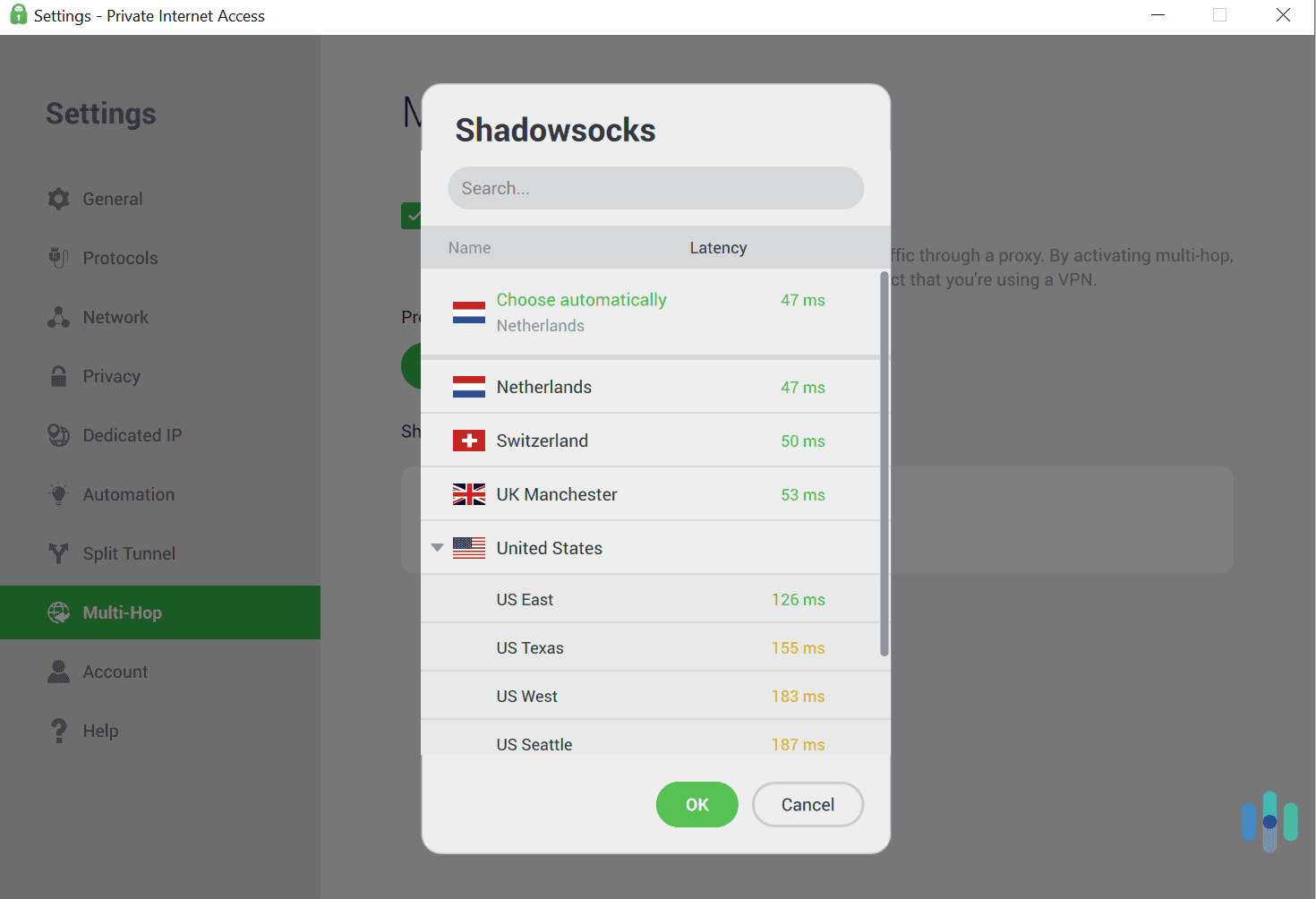
Obfuscation is a security feature that masks your VPN traffic, making it resemble normal internet traffic. This tool comes in handy if you don’t want anyone to detect your VPN traffic or if you need to bypass VPN connection blocks on restrictive networks (like at work or school).
Obfuscation could also help you bypass VPN blocks in restrictive countries like China or Russia. However, we need to highlight that there’s no guarantee this will work with Private Internet Access. We asked five different live chat reps, and they all told us that there’s only a 50 percent chance that obfuscation would allow PIA to access the web in restrictive regions.
PIA provides obfuscation via Shadowsocks, which is an encrypted proxy that’s widely used to get around internet censorship in China. To use obfuscation, you just need to switch to the OpenVPN protocol, and then pick one of PIA’s Shadowsocks servers (it has servers in six countries.)
FYI: Obfuscation could cause noticeable slowdowns since it adds an extra layer of encryption to the VPN connection (the obfuscation layer). Plus, PIA provides obfuscation by routing your traffic through an additional server, namely the Shadowsocks server. When we enabled obfuscation, we noticed a 25 percent decrease in VPN speeds.
MACE (Ad-Blocker)
MACE is PIA’s ad-blocker, which is a security feature that gets rid of ads, stops ad trackers from monitoring your online preferences, and blocks connections to malicious websites. To use MACE, you need to enable it and then connect to one of PIA’s servers.
We used MACE while browsing several ad-heavy websites, and it worked pretty well. It was able to block pretty much all ads, making web pages load faster. What’s more, it was even picked up by ad-block detectors on a few media outlets.
That said, we noticed that MACE can’t block YouTube ads. If this is a deal-breaker, consider getting NordVPN instead. When we reviewed NordVPN, we never saw any ads on YouTube while using its Threat Protection Pro feature. Plus, it’s a bit more convenient to use since you don’t need to be connected to the VPN for it to run.
From Our Experts: We also want to highlight that NordVPN can more than just block ads; it also blocks downloads that contain malware. In fact, it’s so good at blocking malware downloads that we included NordVPN in our list of the best antivirus and VPN bundles (alongside Surfshark One and TotalAV).
Private Internet Access Servers, Streaming & Torrenting
Highlights:
- Servers in 91 countries
- Servers in each U.S. state
- Optional dedicated IP addresses
- RAM-based servers
- Streaming-optimized servers
- P2P servers
- SOCKS5 proxy and port forwarding
In this section, we’ll cover the size of Private Internet Access’ server network and any server-related features. We’ll also tell you about our experience with using PIA to stream content and download torrents.
Server Network
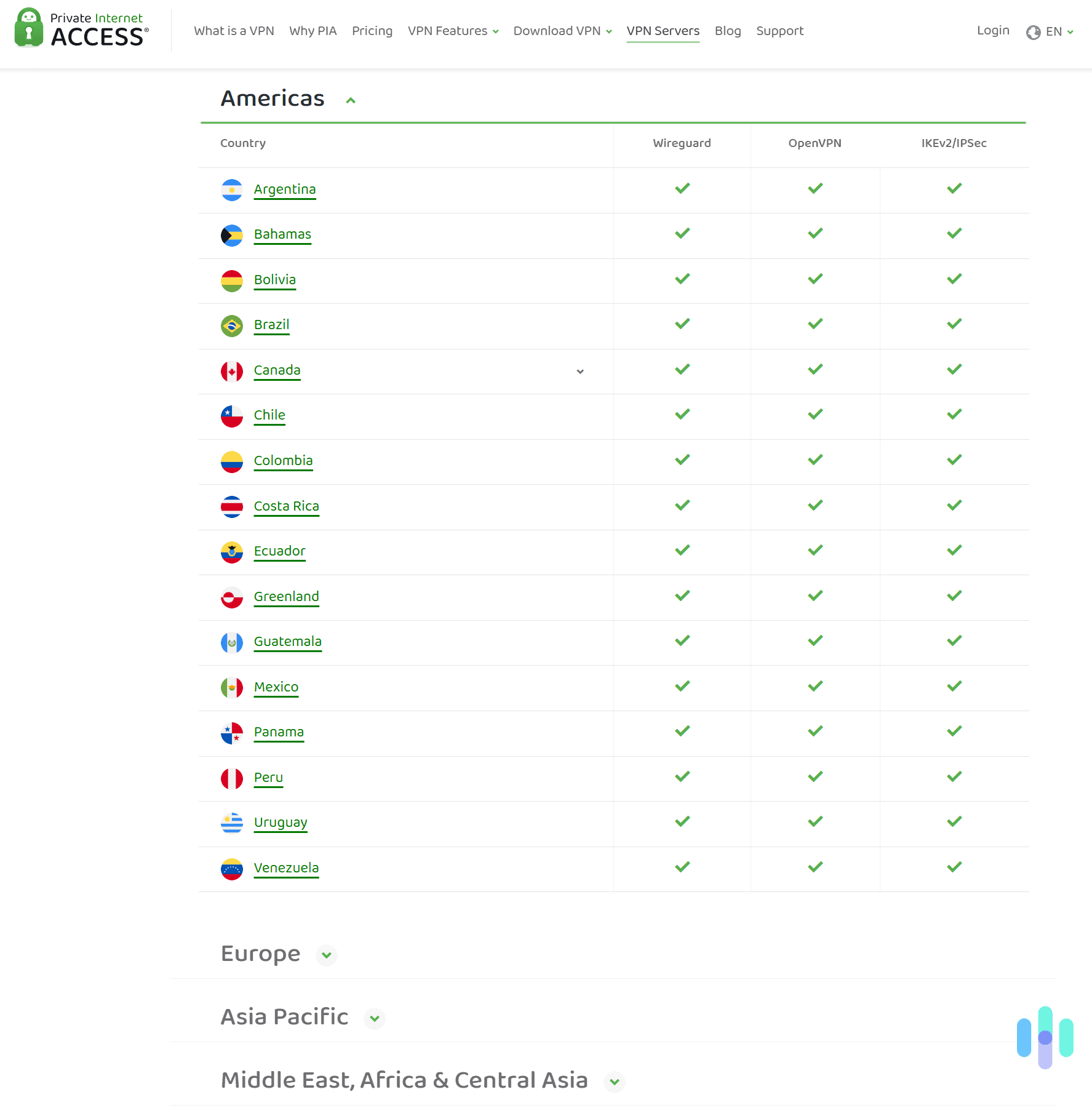
When we used Private Internet Access’ apps, we counted a total of 91 countries. Other top competitors (like NordVPN and ExpressVPN) offer slightly more countries, but PIA’s number of countries is still pretty impressive. Plus, we like how the servers are evenly spread around the world since the VPN has server locations across the Americas, Europe, the Middle East, and Asia. We’d also like to highlight how PIA has a server in literally every U.S. state, which is something we haven’t seen from any other VPN we tested. That makes PIA great for U.S.-based users, as well as for getting a U.S. IP address outside the country.
We also saw that Private Internet Access offers paid access to dedicated IP addresses. A dedicated IP is only assigned to you, so you don’t share it with other VPN users. The VPN offers dedicated IPs in 10 countries, including the U.S., Japan, Singapore, the U.K., and Canada. PIA also has a privacy-focused dedicated IP system. Basically, you use a token to generate an anonymous key that you use to redeem a dedicated IP address. This way, PIA doesn’t know which dedicated IP is assigned to you.
Pro Tip: We only recommend getting a dedicated IP address if you want to securely access your bank account. Some bank sites actually block shared VPN IPs. Also, a dedicated IP could help you avoid captchas on search engines and websites.
RAM-Based Servers
We were really happy to learn that Private Internet Access’ entire server network is RAM-based. This means that all server data is saved to a volatile memory (RAM) instead of a hard drive. This way, whenever a PIA server is rebooted, all data stored on it is completely wiped. We think this provides an extra layer of security, and it’s the kind of security feature that very good VPN services offer. NordVPN, Surfshark, and ExpressVPN, for example, all use RAM-based servers as well.
Streaming
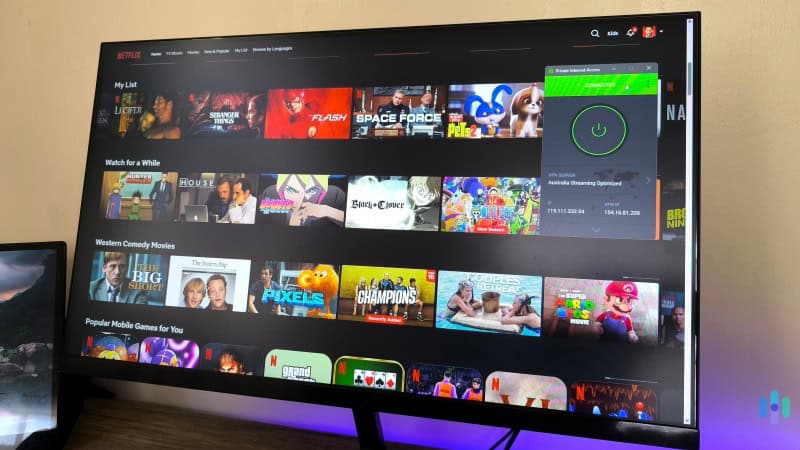
Private Internet Access provides great streaming support, and we actually consider it to be one of the best streaming VPNs in 2025. The VPN claims to work with over 40 streaming platforms. We tested over 20 of them, including Netflix, Amazon Prime Video, Max, Disney+, Hulu, BBC iPlayer, Paramount+, ITV, and ESPN+. We were always able to access those streaming services without any issues.
However, we were only able to use Private Internet Access to stream as long as we used the VPN’s streaming servers. Those servers are located in 11 countries, including the U.S., the U.K., Germany, Japan, Australia, and Canada. And the servers are configured to refresh their IPs very often, which makes it hard for streaming sites to block them. When we tried using PIA’s regular servers to access streaming sites, we were always blocked.
We also like how Private Internet Access provides access to a smart DNS. This is a useful streaming tool that changes your location data. It doesn’t hide your IP address or encrypt your traffic like a VPN, so you shouldn’t use it if you’re focused on privacy and security. We mainly recommend using the smart DNS to stream on devices that don’t support VPN apps, like gaming consoles or certain smart TV models. PIA’s smart DNS can access streaming services from five countries: the U.S., the U.K., the Netherlands, Japan, and Germany.
FYI: PIA is also one of the best VPNs for Netflix in 2025. That’s because it works really well with up to 10 Netflix libraries, including popular ones like Netflix U.S., Netflix U.K., Netflix Japan, and Netflix Australia.
Torrenting
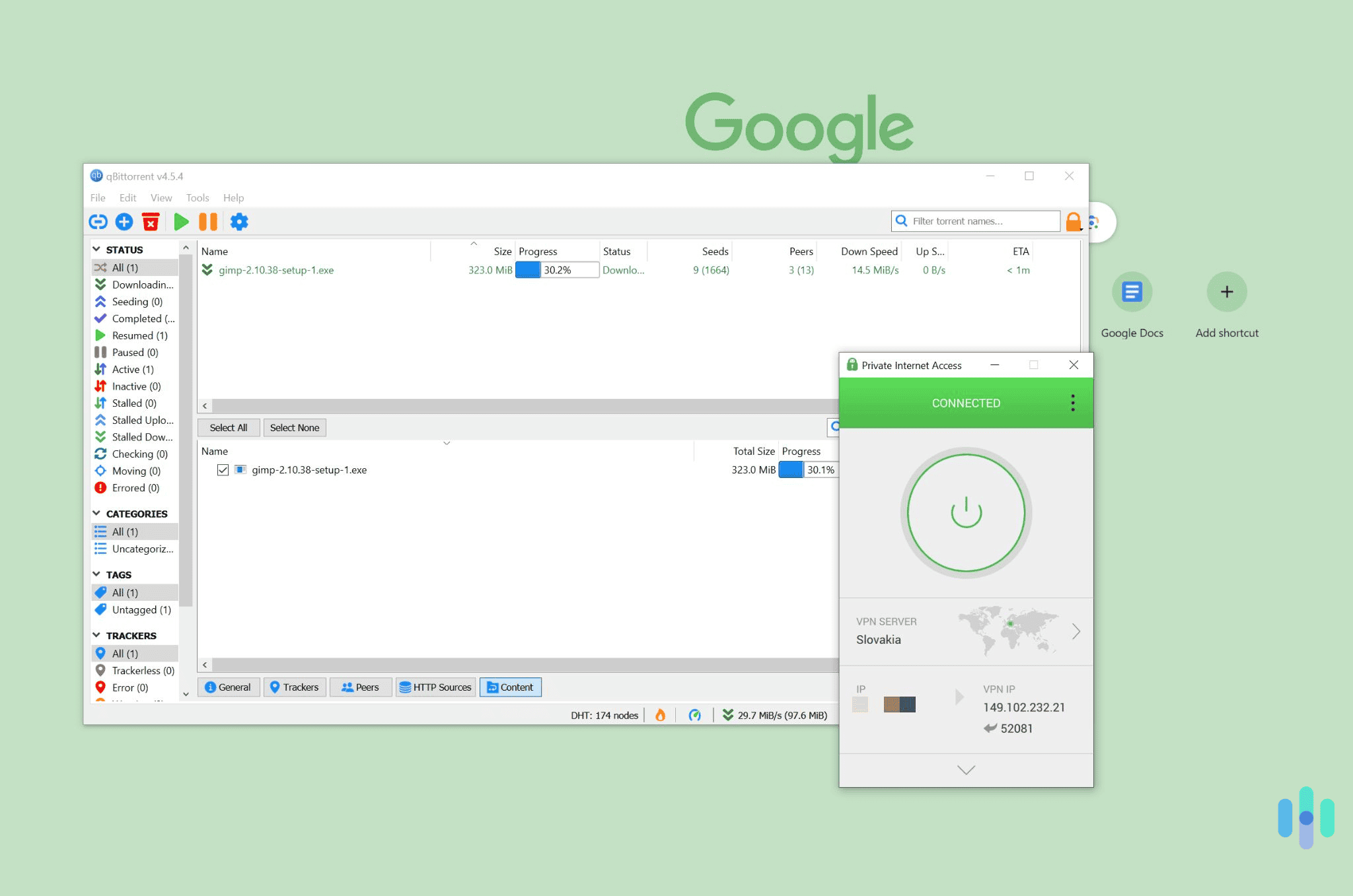
In our opinion, Private Internet Access is one of the best torrenting VPNs in 2025. We really like how it supports torrenting on all of its servers. Some top VPNs only allow torrenting on a few dedicated server locations. That makes it hard for some users to torrent on nearby servers to get fast speeds. And a few VPNs don’t support torrenting at all, like TunnelBear.
On top of that, we like that PIA provides support for port forwarding and SOCKS5 proxy connections. Here’s why that’s important:
- Port forwarding: This is a feature that allows you to increase your torrenting speeds by connecting to more peers. Essentially, it means you’ll be able to connect to more users who are downloading the same torrent as you, which allows you to download the file faster.
- SOCKS5 proxy support: PIA has a SOCKS5 proxy server that you can configure in your P2P app, so that it uses it to download torrents. The SOCKS5 server will hide your IP address while you torrent, so you won’t need to use the VPN for that. The SOCKS5 proxy server also doesn’t offer encryption, which means that it’s significantly faster than the VPN.
FYI: We tested both port forwarding and SOCKS5 proxy features to see how they impact P2P speeds compared to a regular VPN server. With port forwarding, we noticed a 15 percent boost in our download speeds, which is pretty good. And with a SOCKS5 proxy connection, our P2P speeds were around 50 percent faster.
Private Internet Access Speed & Leak Tests
In addition to its features, we also tested PIA’s connection speeds. On top of that, we ran several leak tests while connected to the VPN’s servers to make sure it’s truly safe to use.
Private Internet Access Speed Tests
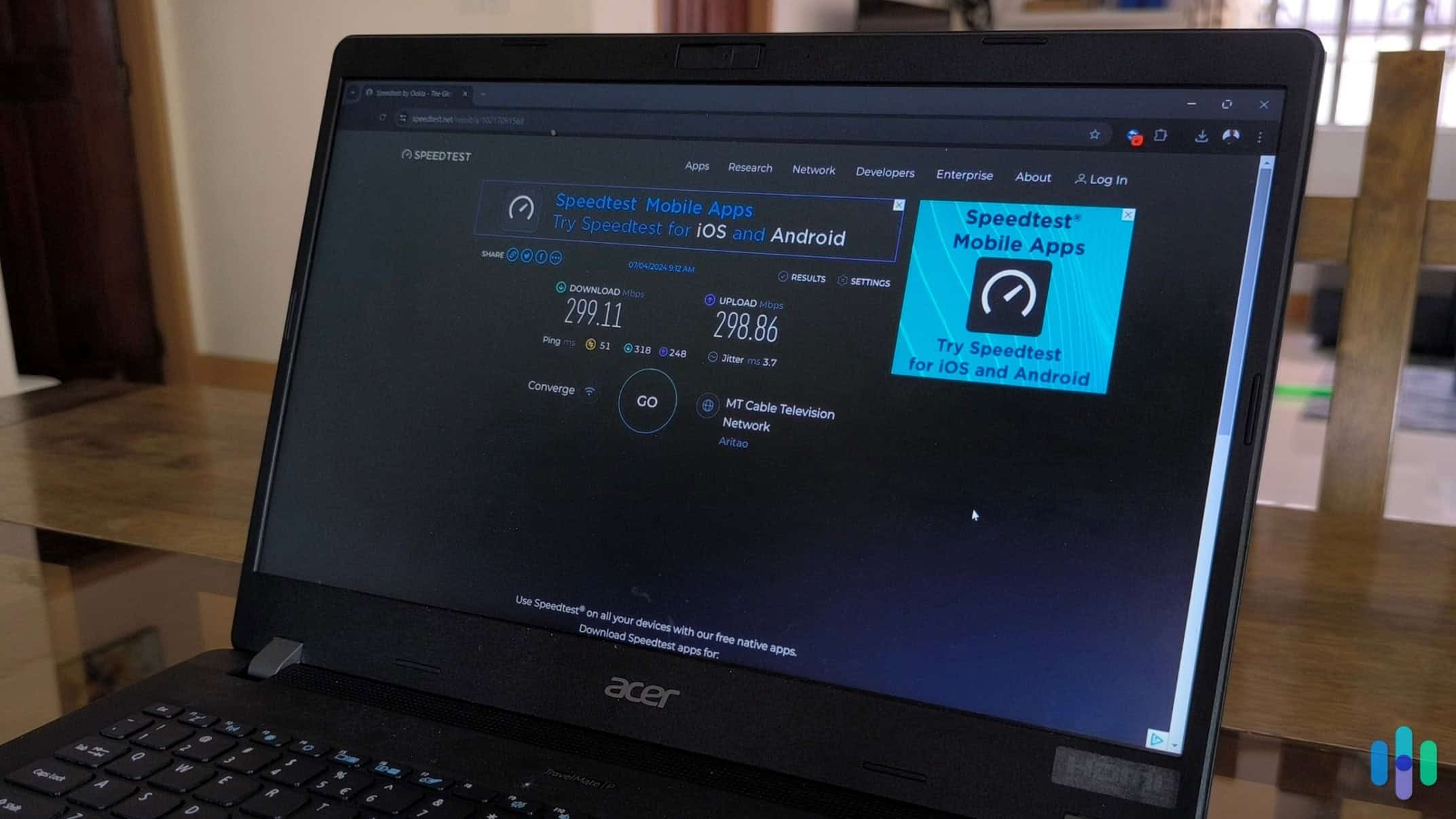
We regularly test top VPNs’ speeds, and Private Internet Access performs pretty well. It generally maintains very fast download speeds, but it doesn’t offer the best upload speeds. On average, we noticed that PIA slows down our download speeds by around only 4.84 percent. This is really impressive, especially considering that other top VPNs have a bigger impact on download speeds. For example, when we reviewed UltraVPN, the service slowed down our download speeds by a whopping 67 percent.
However, when it comes to upload speeds, Private Internet Access usually slows them down by up to 85 percent, which unfortunately becomes pretty noticeable. If this is a deal-breaker for you, consider checking out NordVPN. When we tested it, it gave us fast, symmetrical speeds. Both our upload and download speeds went down by only about five percent.
We also tested our Private Internet Access connection by doing some bandwidth-heavy activities. When we used PIA to surf websites, watch HD and 4K videos on sites like Netflix, and play online games, we generally had very good speeds. Every site we accessed loaded instantly, the videos we watched never buffered, and we only experienced minimal lags and high pings while playing games like Fortnite or Roblox.
We also tried uploading a video to our YouTube channel with Private Internet Access. It took around 35 minutes for the upload to finish, which isn’t ideal. Especially when considering that, without a VPN, the upload only took around 11 minutes.
>> Read More: The Fastest VPNs in 2025
Private Internet Access Leak Tests
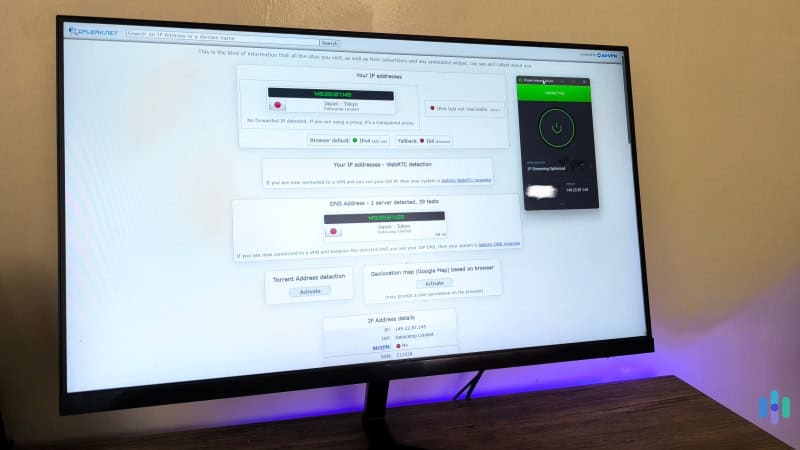
Most people use VPNs for privacy and security. Unfortunately, a VPN can’t provide either of them if it leaks your IP address. That’s why we tested PIA for IPv6, DNS, and WebRTC leaks. IPv6 and WebRTC leaks can reveal your real IP address while connected to a VPN. And DNS leaks make it possible for your ISP to monitor your DNS traffic. That means they’d be able to see your browsing even if you’re using a VPN.
PIA claims to provide built-in protection against all types of leaks, but we wanted to be sure of that. So, we ran leak tests on servers in 55 countries. We used the ipleak.net tool since it tests for all types of leaks.2 We spent a couple of hours running the leak tests, and we’re happy to say that the results never displayed our real IP or DNS addresses.
>> Find Out More: How to Check That Your VPN Is Working
Private Internet Access User Experience
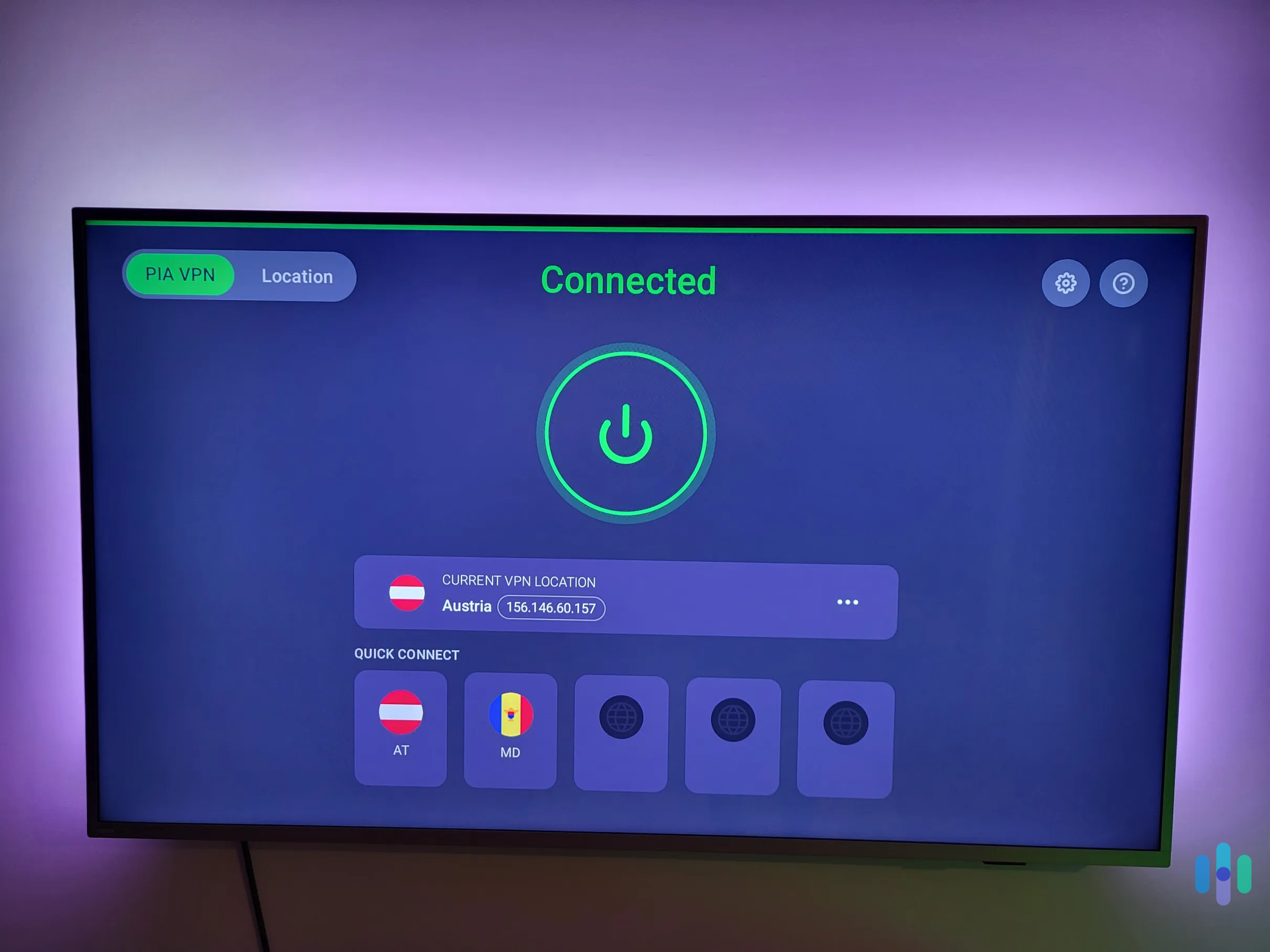
We’re really impressed with PIA’s user experience. For starters, it offers excellent cross-platform compatibility. It has a VPN app for all platforms: Windows, macOS, Linux, iOS, Android, Android TV, Fire TV, and Apple TV. It also supports manual router setups on popular router models and firmware. Plus, it’s also one of the best multi-device VPNs in 2025 since it supports unlimited simultaneous connections, so you can use it on as many devices as you want.
We tried out the VPN’s desktop, mobile, and smart TV apps, and we were overall very happy with all of them. We like how intuitive the interface is — it makes it very simple to find and connect to different servers. Plus, we’re happy to see that all settings and features come with quick, helpful explanations. So, you never feel lost or overwhelmed while using PIA’s apps.
And on top of that, PIA’s apps also offer other perks that improve the user experience:
- Automation: PIA’s apps allow you to set up automation rules for how the VPN behaves when you connect to a network. For example, you can set up PIA to automatically connect to a server when you connect to public Wi-Fi. That ensures your data is always protected when you’re on the go or traveling.
- Customizable interface: PIA’s connection screen has an expandable display that shows different tabs, which include connection information and quick settings. And we really like how you can customize those tabs. You can drag and rearrange them, and also pin the tabs to the main connection screen. We personally pinned the quick settings tab to the connection screen, so that we could quickly enable or disable the MACE and port forwarding features.
- Mobile app widgets: On mobile, you can create a widget for PIA that shows up on your home screen. This way, you can quickly connect to the last server you used with just one tap, without having to access PIA’s app.
- Split-tunneling: This is a feature that lets you choose which data goes through the VPN, and which data doesn’t. PIA allows you to split-tunnel both apps and websites, though that varies from device to device. For example, on Android, you can only split-tunnel app traffic.
- Server ping: PIA shows the server ping for all server locations. This is a metric that shows how fast your device can exchange data with the server. The lower the ping, the faster your connection speeds will be. We like that PIA shows this metric, as it makes it easy to find the fastest servers.
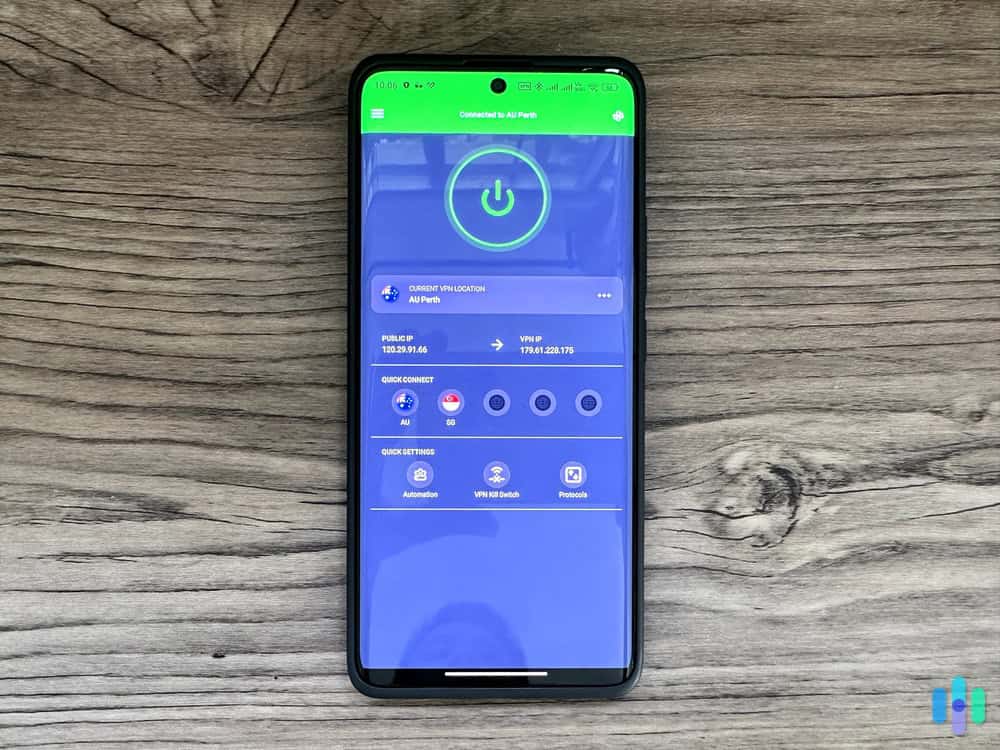
We tried out PIA’s split-tunneling, and it always worked really well. For example, we used the feature to solve an issue where our office Wi-Fi printer wouldn’t work well with VPN-connected computers. So, we looked up our printer’s IP address and excluded it from PIA. Our computers then communicated with the printer outside the VPN tunnel.
We also want to highlight how PIA is one of the only VPNs (alongside Surfshark) to support split-tunneling on macOS 11 and above. Many top VPNs either don’t support split-tunneling on macOS (like NordVPN, for example). Or they only support the feature on older macOS versions (ExpressVPN, for instance).
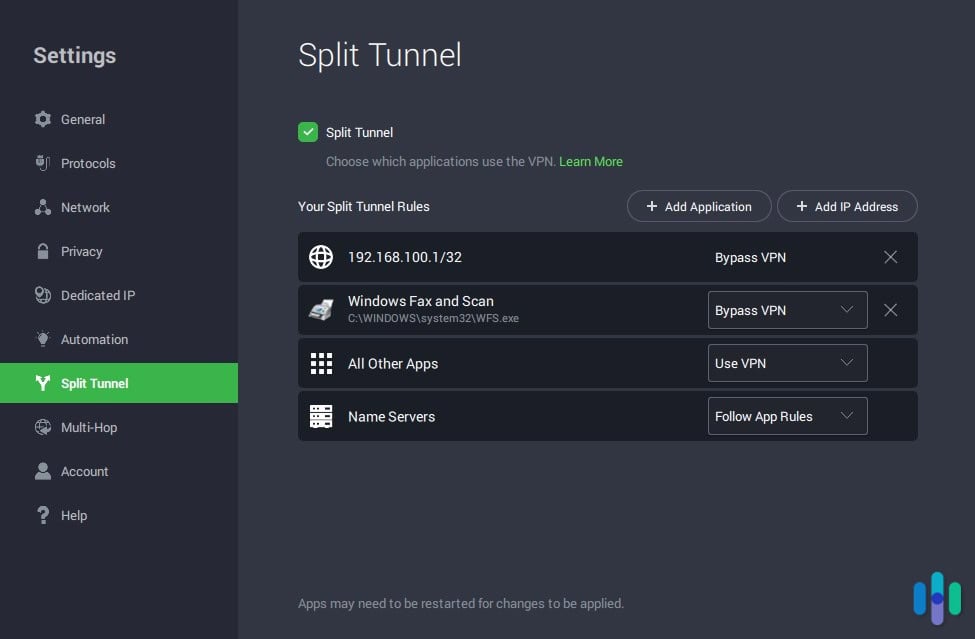
Private Internet Access Customer Support
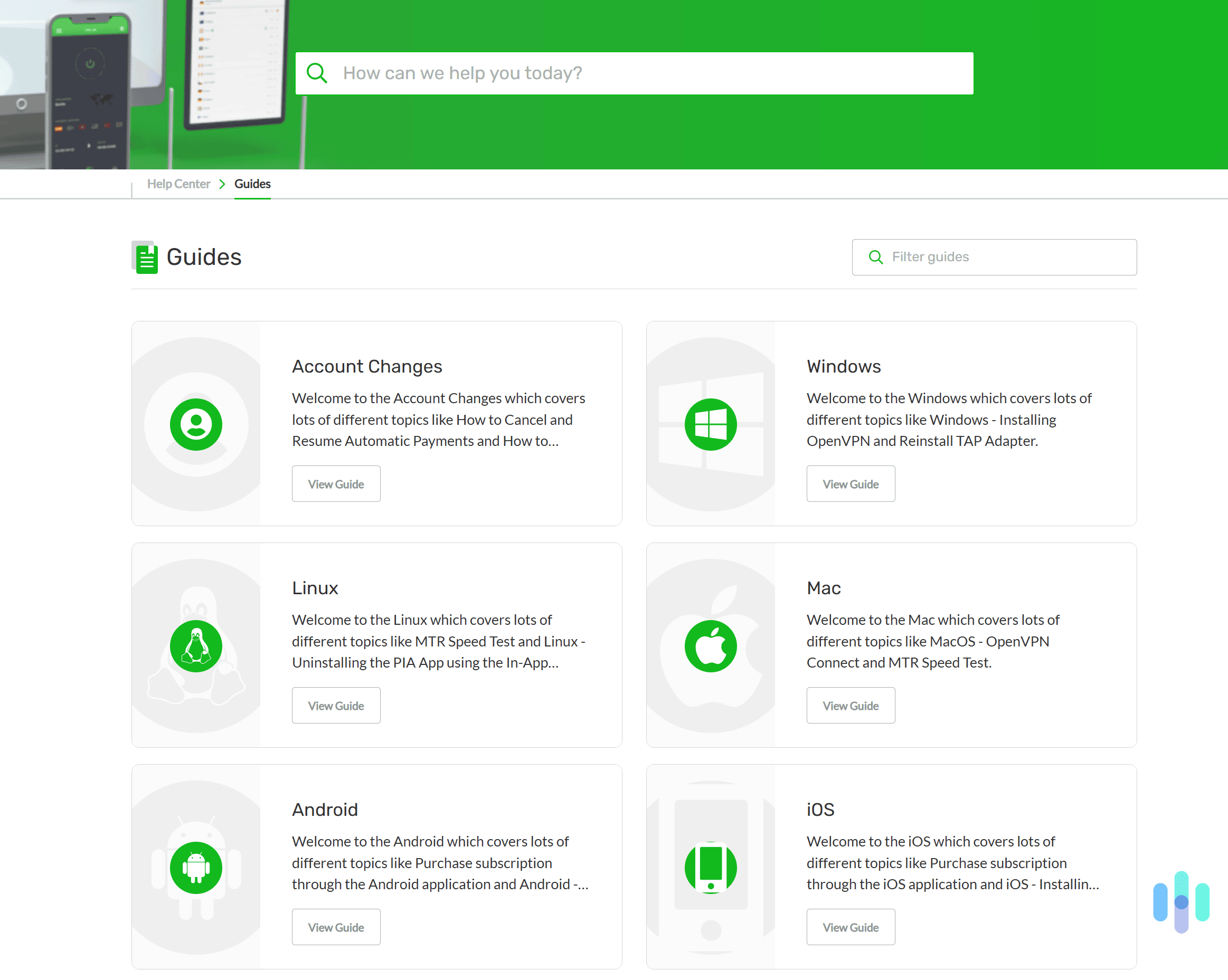
PIA provides access to a support library, 24/7 live chat, and email support. We read through most of the support articles available on PIA’s site, and we’re really satisfied with them. PIA has tons of step-by-step setup tutorials that are easy to follow, even for beginners. Plus, the support section also provides access to many useful FAQs and troubleshooting guides. We also like how some of the support articles include screenshots.
We also tried out PIA’s live chat over the course of two weeks. We had a good experience most of the time, but we have also experienced a few inconvenient live chat interactions. When the live chat system worked well, we were usually connected to a live chat rep in less than 10 seconds, and the reps we talked with were able to provide us with helpful answers.
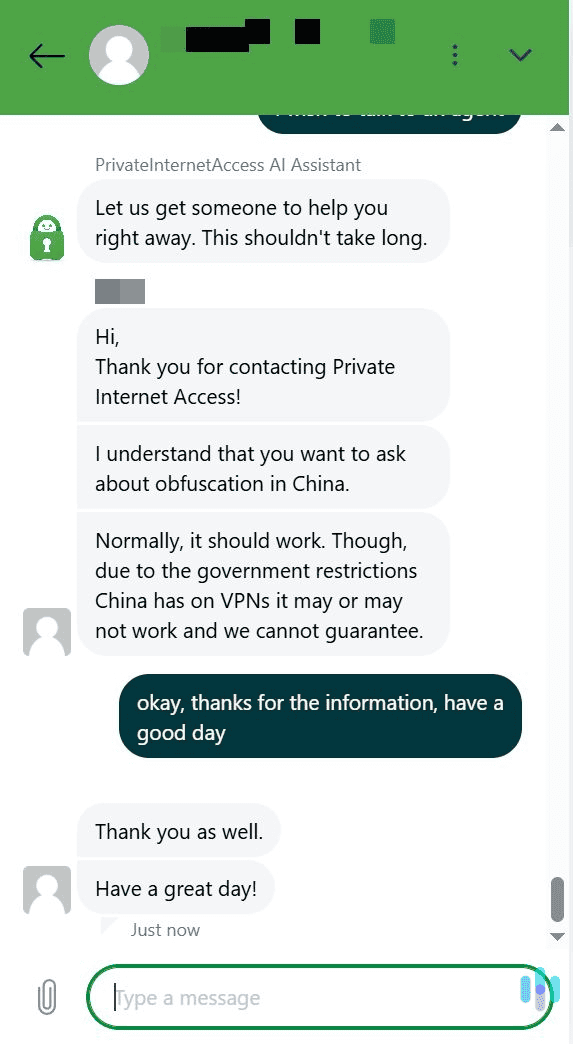
However, on a few occasions, we had trouble using the live chat system — it just didn’t load, so we had to try later. We also came across three live chat reps who took very long to reply to our questions and some were unable to give us accurate answers.
We tried email support, too, and we had a good experience with it overall. We usually heard back from PIA’s email reps in less than 24 hours. And the email reps were able to provide us with accurate and detailed answers.
Video Review
Want to see Private Internet Access in action? In this video review, our Chief Editor Gabe Turner gets hands-on with the product to see how it performs.
Find out how Private Internet Access compares to other VPNs
For a closer look at how Private Internet Access performs, we compared it with other popular VPNs.
Our PIA Research and Data
The following is the data and research conducted for this review by our industry experts. Learn More.
Encryption
| In Transit | Yes |
|---|---|
| At rest? | Yes |
| All network communications and capabilities? | Yes |
Security Updates
| Automatic, regular software/ firmware updates? | No |
|---|---|
| Product available to use during updates? | No |
Passwords
| Mandatory password? | Yes |
|---|---|
| Two-Factor authentication? | Yes, but must opt in |
| Multi-Factor authentication? | No |
Vulnerability Management
| Point of contact for reporting vulnerabilities? | |
|---|---|
| Bug bounty program? | Yes |
Privacy Policy
| Link | Privacy Policy |
|---|---|
| Specific to device? | No |
| Readable? | Yes |
| What data they log | Payment method, login ID, date, time of registration, email address, payment data, cookies, state and zipcode |
| What data they don’t log | Metadata logs regarding when a subscriber accesses the VPN service, how long a subscriber’s use was, and what IP address a subscriber originated from, IP addresses |
| Can you delete your data? | Yes |
| Third-party sharing policies | No, but might share data among subsidiaries and services used to improve service |
Surveillance
| Log camera device/ app footage | Not applicable |
|---|---|
| Log microphone device/ app | Not applicable |
| Location tracking device/ app | Not applicable |
Parental Controls
| Available? | No |
|---|
Company History
| History of Breaches or Security Issues? | Yes |
|---|---|
| Action Taken? | Applied patches to fix vulnerabilities |
Additional Security Features
| Privacy Shutter | Not applicable |
|---|---|
| Privacy Zone | Not applicable |
Our Final Verdict on PIA VPN
PIA is an all-around great VPN. It improved upon the aspects we loved when we first tested it — customizability and usability — while improving a host of its other features as well. We’re particularly happy with the advanced kill switch and split-tunneling tool.
While we made a few not-so-good observations, like the lower upload speed and inconsistent live chat support, we found no fault in the VPN’s security and privacy. It has a better privacy policy than most other VPNs, allowing users to opt in and out of some data collection practices.
Overall, we’d recommend Private Internet Access if you are:
- Looking for an affordable VPN: Prices start at $1.98 per month.
- A frequent traveler or American living abroad: It has servers in 91 countries, including one in each U.S. state.
- Very interested in torrenting: It provides excellent P2P support, and it also offers great privacy and security for torrenting.
If you’re not satisfied with PIA, though, you can always use our VPN buying guide to help in your search. There, we highlight the most important aspects you should consider when buying a VPN.
Frequently Asked Questions
Do you still have more questions about PIA VPN? We’ve got the answers!
-
Is Private Internet Access a good VPN?
Yes. Private Internet Access is a good VPN with servers in 91 countries. It doesn’t log web activity or IP addresses, and it uses top-notch protocols (OpenVPN, IKEv2/IPSec, and WireGuard) as well as strong encryption standards (AES and ChaCha20).
-
Does Private Internet Access have a business VPN?
Private Internet Access doesn’t have a business-only VPN service, but its consumer VPN can be used by small businesses since it allows unlimited connections. Besides offering customizations that can be handy to a business’ IT department, it also offers affordable plans with bulk discounts.
-
Who owns Private Internet Access?
Private Internet Access was originally founded by London Trust Media but was acquired by Kape Technologies in 2019. Kape Technologies owns some of the industry’s best players, including CyberGhost VPN and ExpressVPN.
-
Does Private Internet Access have a free trial?
Private Internet Access does have a free trial if you buy a subscription from the Google Play Store or the Apple App Store. It’s good for seven days. However, if you buy from PIA’s site directly, you only get a 30-day money-back option.
-
Does Private Internet Access offer discounts?
Yes. The most reliable way to get discounts is to buy an annual or multiyear subscription, as they are cheaper on average than the monthly plan. However, PIA also offers extra months from time to time to those buying its longest plan. The VPN also often runs seasonal promotions during Halloween, Christmas, Thanksgiving, or Black Friday.
-
Private Internet Access. (2025). Do you offer a SOCKS5 proxy?
https://helpdesk.privateinternetaccess.com/kb/articles/do-you-offer-a-socks5-proxy
-
IPLeak.net. (2025). IP/DNS Detect.

